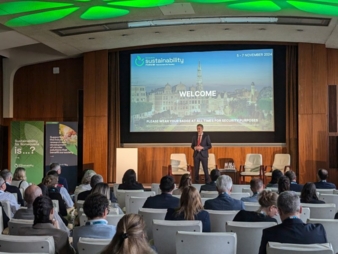29.11.24 – Events
Edana hosted Sustainability Forum 2024
The Sustainability Forum 2024 showcased pathways to a greener future for the Nonwovens Industry.
Edana, the leading global association for the nonwovens and related industries, concluded its annual Sustainability Forum at the prestigious KBR Royal Library of Belgium in Brussels. This year's forum, themed “Building a Sustainable Future Together,” featured a series of keynote addresses, panel discussions, and collaborative sessions focused on environmental responsibility, corporate social responsibility, and circular economy innovations within the nonwovens sector. With an agenda that bridged policy and practice, the Forum highlighted the latest advancements and strategies aimed at tackling climate change, reducing waste, and enhancing sustainability practices.
Keynote highlights
The forum featured two keynote speakers in the world of sustainability. First, Ana Rovzar, Founder of Polygon AR, opened the Forum with a keynote on the accelerating transition to clean energy. In her speech, she discussed the shift from conventional energy investments to renewables, noting a 50% growth in renewables in 2023 alone. In another impactful keynote, sustainability expert Mike Barry, formerly of Marks & Spencer, stressed the importance of aligning corporate strategy with sustainability.
Innovative industry perspectives and EU policy impacts
The Forum's sessions offered a unique blend of forward-thinking ideas and practical approaches to sustainability. Edana’s own Sustainability and Technical Affairs Manager, Marta Roche Díez, reflected on the organization's achievements over the past year and outlined future goals to drive sustainable innovation in the Nonwovens Industry. “Our vision for sustainability is an evolving roadmap, but we’re proud of the progress made and are committed to championing impactful changes”, underscoring Edana’s commitment to environmental responsibility in collaboration with EU directives.
Corporate and product sustainability: a deep dive
Several industry leaders shared insights on integrating sustainability at every level of business. Carsten Ruff from Nitto Advanced Film Solutions discussed the challenges and strategies of embedding sustainability in corporate culture, particularly in a multinational setting. “Sustainability is not a contradiction to industrial applications; it’s a powerful driver of innovation”, he observed. Martijn Gipmans from Sphera Solutions highlighted the business value of transparency and life-cycle assessments (LCA). “LCA and transparent ESG reporting can catalyse both business growth and environmental progress”, he explained, stressing the importance of integrated sustainability assessments to reduce the carbon footprint of entire product portfolios.
The path forward: advancing circularity and green innovation
One of the most discussed topics was the industry's transition toward a circular economy. Albert Hammerschmied from Freudenberg Performance Materials highlighted the importance of post-industrial waste in achieving circularity, particularly in the automotive sector.
Building a sustainable health sector
Danielle van Horzen, Global Marketing Manager for Hygiene and Healthcare at SABIC, discussed advanced recycling solutions in the healthcare sector. Addressing the challenges of medical waste recycling, she stated, “A significant amount of medical waste is not contaminated, offering us opportunities to create circularity in healthcare.” She pointed to the potential for advanced chemical recycling to enable circular models, helping to tackle the pressing issue of sustainable medical waste management.
Visit to the European Commission
The third day of Edana’s Sustainability Forum 2024 concluded with an insightful visit to the European Commission, offering attendees a unique opportunity to engage directly with policymakers and gain first-hand insights into the EU's sustainability agenda. Hosted at the Charlemagne Building, discussions centred on pivotal elements of the EU Green Deal, including the establishment of Extended Producer Responsibility (EPR), the scope and implementation of the Single-Use Plastics Directive (SUPD), and the Eco design for Sustainable Products Regulation. Featuring presentations from prominent EU officials like Vicenzo Gente and Werner Bosmans, attendees delved into how these regulations are shaping sustainability strategies across industries. Bridging policy and practice emerged as essential, reinforcing the forum’s dedication to aligning industry actions with current EU regulatory frameworks. The session offered a strong conclusion to the event, reinforcing a shared commitment to a sustainable future in collaboration with EU leaders and regulatory bodies.


